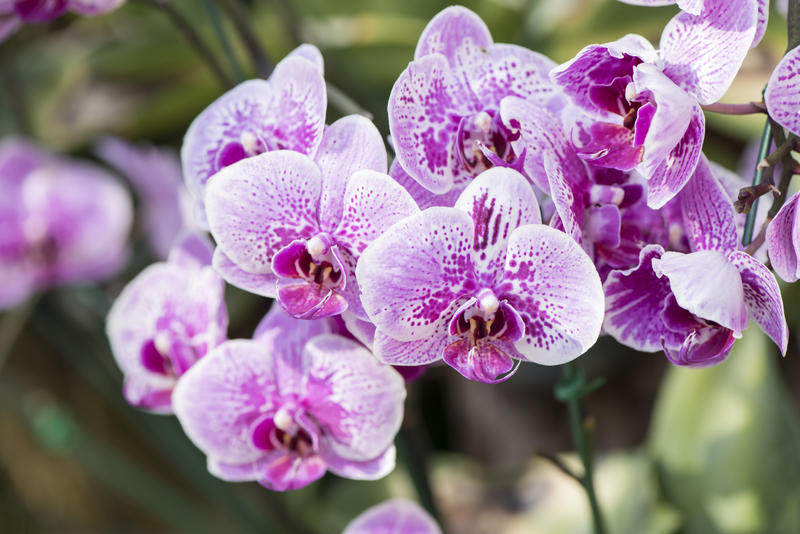Achieve Gardening Excellence with These 3 Weed Control Tips
Posted on 26/08/2025
Achieve Gardening Excellence with These 3 Weed Control Tips
Are you dreaming of a lush, vibrant garden free of pesky weeds? Gardening excellence starts with a solid strategy for weed control. Weeds can overrun your flower beds or vegetable plots, competing with desired plants for nutrients, sunlight, and water. Implementing effective weed management solutions not only enhances your garden's beauty but also strengthens the overall health of your plants.
In this comprehensive guide, we unveil three powerful weed control tips that will help you create a thriving, low-maintenance garden. Whether you're a seasoned horticulturist or a complete beginner, these practical methods are designed to elevate your gardening experience and ensure you reach new heights of horticultural success.
Why Effective Weed Control is Essential for Gardening Excellence
Unwanted weeds are more than just an eyesore. They can quickly take over your garden, crowd out your precious plants, and invite diseases and pests. Employing weed control techniques is crucial for several reasons:
- Protects Crops and Flowers: Weeds compete with cultivated plants for resources.
- Reduces Maintenance: Minimizing weeds means less time spent pulling them by hand.
- Prevents Pest Infestation: Weeds can harbor pests and promote fungal diseases.
- Improves Garden Appearance: A weed-free garden is visually pleasing and organized.
Let's delve into the top three expert-backed methods that will foster garden mastery and minimize weed issues all season long.

Tip #1: Master Mulching Techniques for Preventing Weeds
What is Mulching and Why is it Important?
Mulching is an age-old gardening technique that involves spreading organic or inorganic material over the soil surface. It acts as a physical barrier to light, suppressing the germination and growth of weeds beneath. Mulch for weed control retains moisture, regulates soil temperature, and gradually enriches the earth as it breaks down.
Types of Mulch for Optimal Weed Prevention
- Organic Mulch: Includes shredded bark, straw, grass clippings, compost, or wood chips.
- Inorganic Mulch: Utilizes landscape fabric, black plastic, or gravel for longer-lasting protection.
How to Mulch Your Garden for Maximum Weed Reduction
- Clear the Area: Remove existing weeds and debris from the garden bed.
- Apply the Right Thickness: Spread a 2-4 inch layer of mulch to ensure total coverage. Too thin a layer might let sunlight through, enabling weed growth; too thick may restrict water penetration.
- Refresh Mulch Regularly: Top up organic mulch as it decomposes to maintain effectiveness throughout the growing season.
- Combine with Fabric: For added protection, lay weed barrier fabric beneath organic mulch. Pierce openings for your plants and cover with your preferred mulch material.
Tip: Never pile mulch directly against stems or trunks of plants to avoid rot and pest problems. Leave a small gap of about an inch for air circulation.
Using mulching in your garden weed management strategy significantly cuts down your maintenance efforts and promotes healthier soil, resulting in vigorous, resilient plants.
Tip #2: Consistent and Efficient Manual Weeding Practices
Why Hand Weeding Remains Invaluable
While there are many technological advances in gardening, traditional hand weeding remains one of the most effective weed control tips. When done correctly and consistently, it prevents the spread of weeds and keeps your garden pristine.
Timing is Everything: Best Time to Weed
- After Rain or Watering: The soil is soft, allowing for easier removal of roots.
- Before Weeds Seed: Remove weeds before they have a chance to flower and disperse seeds throughout your garden.
- Regularly: Check your garden weekly and address weed growth promptly to prevent exponential spreading.
Best Practices for Manual Weed Removal
- Use the Right Tools: Invest in a good hand trowel, hoe, or weeding fork to ease the job and minimize root breakage.
- Pull from the Base: Grasp weeds as close to the soil level as possible and pull gently to extract the whole root system. Broken roots can regrow and perpetuate the problem.
- Dispose of Persistent Weeds Properly: Some species can reroot if left on the ground. Bag or compost weeds that haven't set seed.
- Stay Consistent: Regular diligence is essential for successful weed control in gardens. Make it a part of your gardening routine.
Hand weeding isn't just about eliminating weeds; it's also an opportunity to inspect your plants for early signs of pests or diseases. This hands-on approach embodies gardening excellence by fostering awareness and personal connection to your landscape.
Tip #3: Leverage Smart Planting Strategies to Outcompete Weeds
Harness Nature: Dense Planting for Soil Coverage
One of the most eco-friendly weed suppression methods is to let your desired plants do the work for you. By planning dense, overlapping plantings and selecting ground covers for weed suppression, you can limit the space and resources available to unwanted intruders.
Key Planting Strategies to Prevent Weeds
- Grow Ground Covers: Low-spreading plants like creeping thyme, sweet woodruff, pachysandra, or clover create a living mulch, effectively blocking sunlight from weed seeds.
- Use Companion Planting: Planting species with similar needs close together creates a canopy that smothers weeds and makes the most of your growing space.
- Stagger Tall and Short Plants: Layering heights increases shade at the soil level, further reducing weed germination.
- Fill Gaps Promptly: If a plant dies or is harvested, replace it quickly to prevent weeds from taking over exposed soil.
Best Plants for Weed Control
- Perennial Ground Covers: Ajuga, vinca minor, creeping phlox, and sedum are highly effective at crowding out weeds.
- Annuals: Fast-growing, low-maintenance choices such as marigolds or nasturtiums can quickly fill gaps in bedding areas.
- Ornamental Grasses: Hardy varieties like blue fescue or mondo grass can form dense clumps that leave little room for weeds.
Effective garden design with purposefully chosen, densely planted species not only enhances the aesthetic appeal but also acts as your garden's first defense in any comprehensive weed control strategy.
Bonus Tips: Sustainable Weed Control Methods for Long-Term Success
If you're committed to weed-free gardening, consider supplementing the above core weed control tips with these environmentally-friendly practices:
- Practice Crop Rotation: In vegetable gardens, rotate crops yearly to reduce the persistence of weed species accustomed to particular growing conditions.
- Solarization: Cover sections of soil with clear plastic during hot months to kill weed seeds using solar heat.
- Use Natural Herbicides: Targets persistent problem areas with homemade or organic-certified sprays, such as vinegar solutions. Use sparingly to avoid damaging desirable plants.
- Encourage Healthy Soil: Regularly add compost to increase beneficial microbes, which outcompete or inhibit some weed species from establishing.
Common Weeding Mistakes to Avoid
- Neglecting Early Spring Weeds: Weed seeds start sprouting early; stay vigilant right from the season's beginning.
- Letting Weeds Flower: Allowing weeds to set seed multiplies the problem exponentially for years to come.
- Improper Mulch Application: Too little mulch is ineffective; too much can suffocate your plants.
- Watering Weeds: Drip systems and soaker hoses target water only to crop rows, depriving weeds between rows of moisture.
- Using Harsh Chemical Herbicides Unnecessarily: Overuse can harm beneficial insects, microbial life, and even your own plants.

Frequently Asked Questions About Weed Control in Gardens
How often should I weed my garden?
For gardening excellence, it's best to weed your garden at least once a week during peak growing season. Consistent, attentive maintenance is key to staying ahead of rapid weed growth.
What is the most effective way to kill weeds permanently?
Permanent weed eradication involves a multi-layered approach: mulching, dense planting, regular hand weeding, and addressing weeds before they set seed. While it's impossible to eliminate weeds entirely, these steps will greatly reduce their prevalence.
Are there any natural ways to control weeds without chemicals?
Absolutely! Organic weed management includes methods such as physical mulching, using ground covers, practicing careful hand weeding, applying boiling water on paved areas, or using vinegar-based spot treatments.
Can I compost weeds I pull from my garden?
Many weeds can be composted if they haven't gone to seed. Avoid placing seeding weeds or invasive species in your compost pile, as they can survive and spread when later used in the garden.
Conclusion: Achieve Gardening Excellence with Effective Weed Control
Attaining gardening excellence is well within your grasp when you implement these three top weed control tips:
- Mulch strategically to suppress weeds and feed your soil.
- Weed consistently for a spot-free, vibrant landscape.
- Design with density using ground covers and smart plant combinations.
Weeds are a perennial challenge, but with the right knowledge and a proactive approach, your garden can flourish--lush, healthy, and virtually weed-free. Remember, ongoing attention, sustainable practices, and a willingness to adapt are the hallmarks of successful gardeners worldwide.
Start applying these strategies today and experience the transformation of your outdoor space. For more advice and inspiration on garden maintenance, weed prevention, and cultivating excellence in your green spaces, explore our other resources or consult local gardening experts. A beautiful, weed-free garden is not just a dream--it's an achievable reality!
Latest Posts
Strengthening Your Garden for Adverse Weather Challenges
Plant Your First Garden with 9 Essential Tips
Essential Tools to Elevate Your Outdoor Gardening Experience

